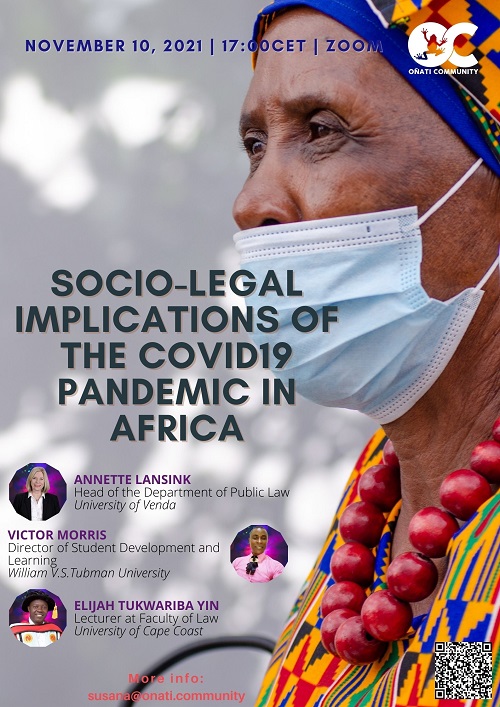https://www.youtube.com/channel/UCzTTPby1MXuKbjphAXGsx2g
Annette Lansink (South Africa) Annette will be talking on the fragility of human rights, the unequal impact of the COVID-19 measures on the poor, the shift of power from the legislature to the executive and the possibility of enhancing democratic legitimacy during a pandemic. The South African response to COVID-19 had the effect of restricting a wide ranging of constitutionally and internationally protected human rights. Although no state of emergency was declared in South Africa, Ministers were given far-reaching powers under a national state of disaster which has now been in force for almost twenty months. A few of these measures were challenged in court raising questions about their rationality, necessity and proportionality in an open and democratic society. But also, about the role of the courts in a pandemic and judicial deference to the government. Moreover, the measures affected the vulnerable the most. The homeless, persons living in informal settlements, those without access to water, those who had to use public transport carried an unequal share of the burden. Women were affected by the ongoing pandemic of gender-based violence. During the early phase of the strict lockdown, the heavy-handedness and brutality of security forces added to the woes of residents in townships.
Dr Elijah Tukwariba Yin (Ghana) Almost all prisons in Ghana are overcrowded with some cells housing between 8-20 inmates instead of 4 as recommended by the United Nations. These prisons lack basic facilities to promote the health and safety of prisoners. One would expect that with the poor prison conditions, the outbreak and upsurge of COVID-19 in Ghana will have dire consequences on the prison population. This was not the case as the prison administration, formally and informally, collaborated with inmates and the mainstream society to prevent COVID-19 prison outbreak. However, in an attempt to manage the pandemic, the legal rights of most inmates were violated. In this presentation, I will show how COVID-19 is impacting prisons in Ghana and how the legal rights of prisoners are mediated.
Victor TK Morris (Liberia) Liberia was badly affected by the Ebola virus in 2014 and since then, the country and its citizens have been very meticulous on issues of a pandemic amid the challenges in the provision of basic health services across the country. Though the COVID-19 hasn't had a drastic impact on the public as compared to other African and European countries, Liberia's education system was affected by the government restrictions on the COVID-19. Schools had to close unexpectedly thereby affecting the academic calendar. The worst-case scenario was the inability of high schools to complete the academic curriculum when senior high students were to sit a region academic evaluation. The pandemic also affected the local and regional trade thereby impacting the lives of ordinary Liberians and the informal sector. Currently, there are mix reactions among Liberians as it relates to the taking of the COVID-19 vaccines. Uncertainty hangs over the state of the pandemic and vaccination because of the level of information being passed down by health authorities.
Annette Lansink is a former Head of the Department of Public Law and former Dean of the School of Law at the University of Venda, South Africa, for two terms. She holds law degrees from universities in South Africa and the Netherlands. She has extensive experience in higher education management. Her research interests and publications are in the areas of public international law, human rights law, gender, the decolonisation of law and transformation of higher education.
Dr. Elijah Tukwariba Yin is a lecturer at the Faculty of Law of the University of Cape Coast (UCC) in Ghana. Currently, Elijah teaches Jurisprudence, Critical Thinking in Law, Criminal Law, and Introduction to Sociology. Before joining the Faculty of Law, he worked with the Department of Social Development as a Social Development Practitioner for 7 years. In his capacity as the After-Care Officer, he functioned as the liaison officer between prison inmates, their families, and barristers. Elijah is a product of the University of Cape Coast in Ghana and the Onati International Institute for the Sociology of Law in Spain. He is also an alumnus of the Institute for Global Law and Policy (IGLP) at Harvard Law School (HLS); a recipient of scholarship awards for the Scholars Writing Workshop in Bangkok, Thailand (2018), and the Global Scholars Academy in Geneva, Switzerland (2020). Elijah has co-edited two books and co-authored one book. He also has some articles and book chapters to his credit.
Victor T.K. Morris is currently the Director of Student Development and Learning Support Services at the William V.S.Tubman University in Harper City, Maryland County in southeastern Liberia. He also serves as an adjunct lecturer at the University teaching Liberian History, Eco-literature, Gender, Feminism, and Contemporary Literature. Before that, he served as a Compliance Officer of the University and Economic Research Analyst at the Ministry of Planning(2010). He is a product of the International Institute for the Sociology of Law(IISL) in Onati, Spain, and was a recipient of an EU grant for graduate studies. He is an alumnus of the African Methodist Episcopal University(AMEU) in Liberia. He is a member of the Social Science Research Network (SSRN) and has been in higher education since 2012. Mr. Morris is currently researching the impact of technical, vocational, and higher education among Liberian females.




